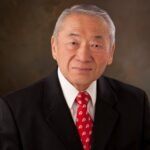 The College of Law mourns the passing of retired judge Raymond Uno—a Utah Law alumnus, the first minority judge in Utah, and a towering figure in the state’s legal community. Uno was renowned for his talent and dedication as a jurist during his long tenure on the state’s district courts. Yet he was just as well-known beyond the bench for his fierce civil rights advocacy and his wide-ranging community activism.
The College of Law mourns the passing of retired judge Raymond Uno—a Utah Law alumnus, the first minority judge in Utah, and a towering figure in the state’s legal community. Uno was renowned for his talent and dedication as a jurist during his long tenure on the state’s district courts. Yet he was just as well-known beyond the bench for his fierce civil rights advocacy and his wide-ranging community activism.
Uno led a remarkable life. As a Japanese American teenager during World War II, he and his family were imprisoned by the federal government and relocated to the Heart Mountain Relocation Center in Wyoming. After being released, Uno volunteered for the military—serving in counterintelligence and working as an interpreter, translator and interrogator for the U.S. Army.
Uno earned his JD from the College of Law in 1958, after receiving bachelor’s degrees in law and political science and his Master of Social Work, all from the U. He practiced law at private firms and in public service, as deputy Salt Lake County attorney and later as assistant attorney general for the State of Utah. Uno then served on the state bench for 25 years, first on the 5th District Court and then on the 3rd District Court.
Uno was a lifelong advocate for the Japanese American community and for equal access in the legal profession. He was a co-founder and the first president of the Utah Minority Bar Association, which has played a critical role in diversifying the legal field in Utah since its establishment. Uno also lent his enthusiasm and expertise to countless community and non-profit organizations.
“Judge Uno lived according to his moral convictions and his vision for a better world,” said Elizabeth Kronk Warner, the Jefferson B. & Rita E. Fordham Presidential Dean and a professor at the College of Law. “He faced extreme injustices as a racialized minority, and despite this—or because of it—he dedicated his life to advancing justice, practicing compassion, and serving his community. He was an inspiration to countless individuals throughout his life, and his tireless efforts left an enduring mark on Utah’s legal profession. He will be deeply missed.”
